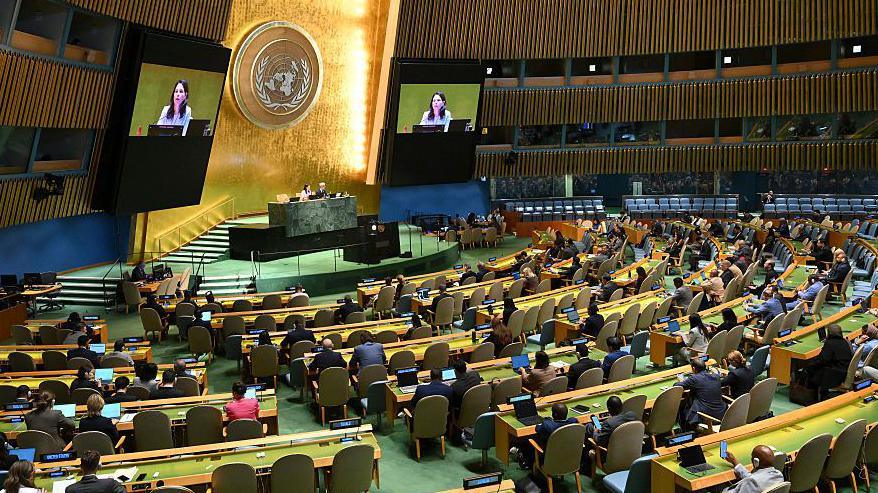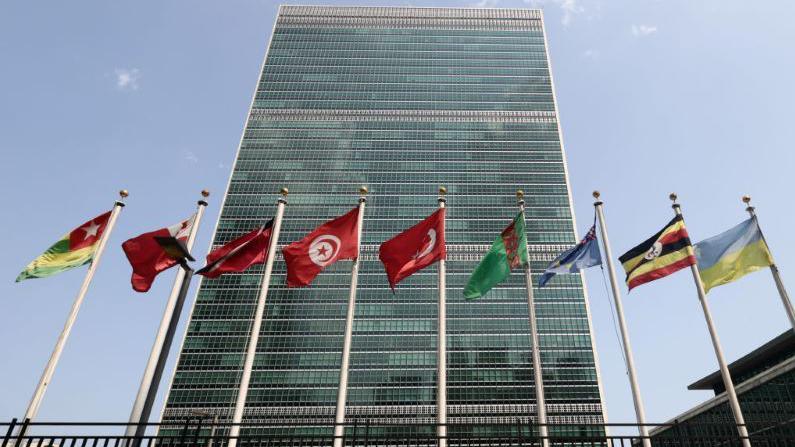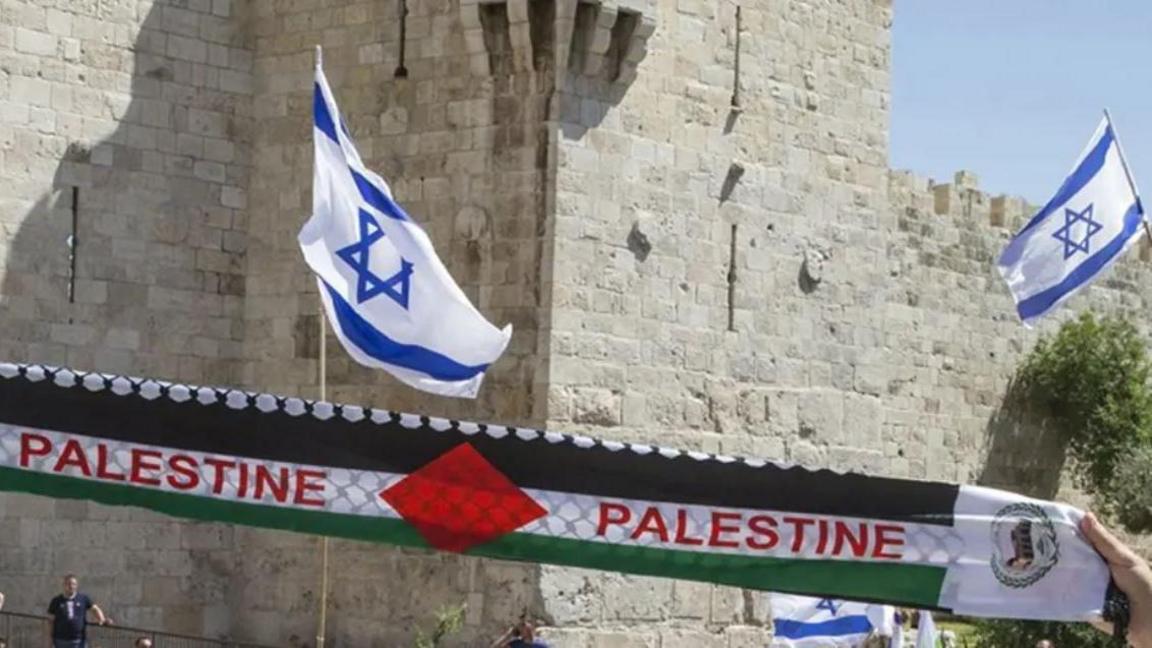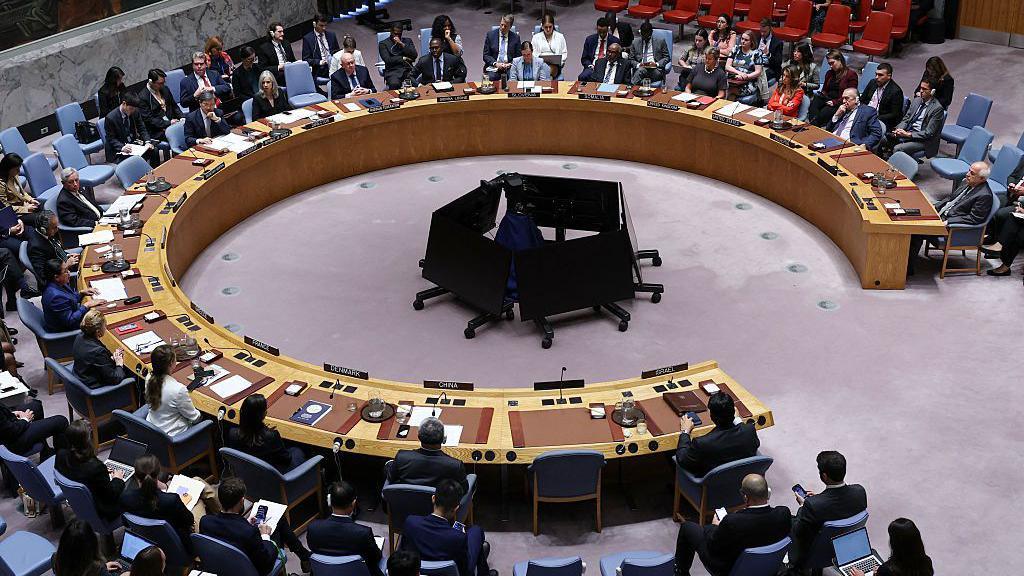UK recognises a Palestinian state

Inside the United Nations building in New York, where representatives from member states across the world assemble
- Published
The UK says it will vote to recognise a Palestinian state at a United Nations meeting in New York.
It will be the first time the UK has voted in this way.
The UK Prime Minister Keir Starmer posted a video on social media saying, "Today, to revive the hope of peace and a two-state solution, I state clearly - as prime minister of this great country - that the United Kingdom formally recognises the state of Palestine."
Palestinian representative Husam Zomlot said that "the wrongs of the past are beginning to be corrected" when he was asked what recognition of a Palestinian state would mean.
Israeli Prime Minister Benjamin Netanyahu said: "We will have to fight both in the UN and in all other arenas against the false propaganda directed at us and the calls to establish a Palestinian state, which would endanger our existence and constitute an absurd reward for terrorism."
BBC correspondents have said that the UK recognition of a Palestinian state is "symbolic", meaning that it is a strong statement but will do little to change the situation in the region.
Read on for more background and explanation on this story
What is a Palestinian State?

'State' is another word for a country.
While there is no one set of things that defines a state, there are some things that they have in common, like a capital, a government, and an army. Having borders which are agreed internationally is also important.
For example, the UK, France and Spain are all examples of states.
States "recognise" each other, which means that they agree that each other exists, and send ambassadors to represent each country.
A state will be a member of the United Nations.
Palestine has some of the things that make up a state but not others.
While many countries recognise it, it does not have a capital or an army.
The reasons for this lie in the history of this part of the Middle-East, and the long-running conflict between Israel and the Palestinians.
History of Israel and the Palestinians

The origins of the conflict between Israel and the Palestinians go back at least a century.
Britain took control of an area called Palestine in the Middle East after World War One.
There was a Jewish minority and Arab majority living there at the time.
Over the next few decades many more Jewish people arrived, with many of them fleeing persecution in Europe, and seeking a homeland after the Holocaust in World War Two.
Both Jews and Palestinian Arabs claimed the land as their ancestral home.
In 1947, the United Nations voted for Palestine to be split in two between a Jewish state and an Arab state.
Jewish leaders agreed to the plan but the Arab side did not.
Britain could not solve the differences and left in 1948. Jewish leaders then declared the creation of Israel.
Palestinians objected to this new state, and a war followed. Neighbouring Arab countries invaded Israel.
By the time the fighting stopped Israel controlled most of the territory, but one area of Palestine, Gaza, was controlled by Egypt, and another area, the West Bank, by Jordan.
These two areas contained thousands of Palestinians who fled or were forced out of their homes in what was now the new Jewish state.
Then, in 1967, after another war, Israel occupied Gaza and the West Bank, and Israeli troops stayed there for years.
Israelis hoped they might exchange the land they won for Arab countries recognising Israel's right to exist and an end to the fighting.
Israel left Gaza in 2005 but soon after, a group called Hamas won elections and took control there.
Hamas, which is a militant group, refuses to recognise Israel as a country and wants Palestinians to be able to return to their old homes.
The UK government has made Hamas a 'proscribed terrorist group', ruling that it has used violence to try to advance its cause.
There have been many failed attempts over the years to find a lasting peace in the region.
For the past few decades, efforts have been based on something called the "two-state solution", which is the idea of having the Jewish state of Israel, and a Palestinian state, existing alongside each other.
But there have been huge disagreements about what that that would look like in practice.
Politicians in the Israeli government say they no longer support a two-state solution.
Who recognises Palestine?

The United Nations Security Council met last week to discuss the war in Gaza
Around three quarters of the 193 member states of the United Nations have recognised a Palestinian state.
The UK now joins them, along with Canada and Australia, who have also said that they will recognise it.
Israel is firmly opposed to countries recognising a Palestinian state.
The US does not recognise a Palestinian state, and on his recent state visit President Trump said he disagreed with the UK's decision to do so.
The position of the US is important on this issue. Any country hoping to become a member of the United Nations must get the approval of the UN Security Council.
The Security Council has five permanent members (US, Russia, China, UK and France) who each have a veto. This means if one of the permanent members votes against Palestinian membership of the United Nations, then it cannot pass, even if everyone else votes for it.
This means that there can not be a Palestinian state until the US agrees.
